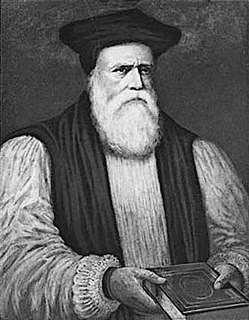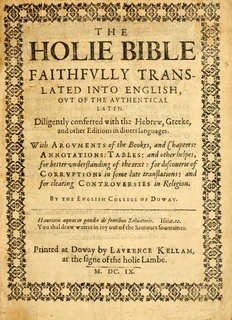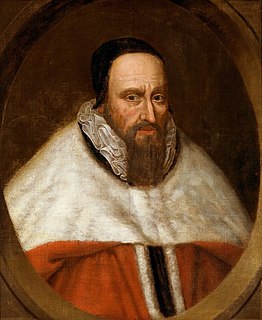Related Research Articles

The King James Version (KJV), also known as the King James Bible (KJB) or simply the Authorized Version (AV), is an English translation of the Christian Bible for the Church of England, was commissioned in 1604 and completed as well as published in 1611 under the sponsorship of James VI and I. The books of the King James Version include the 39 books of the Old Testament, an intertestamental section containing 14 books of the Apocrypha, and the 27 books of the New Testament. Noted for its "majesty of style", the King James Version has been described as one of the most important books in English culture and a driving force in the shaping of the English-speaking world.

William Tyndale was an English scholar who became a leading figure in the Protestant Reformation in the years leading up to his execution. He is well known for his (incomplete) translation of the Bible into English, influenced by the work of Erasmus of Rotterdam and of Martin Luther.

The New World Translation of the Holy Scriptures (NWT) is a translation of the Bible published by the Watch Tower Bible and Tract Society. The New Testament portion was released in 1950, as The New World Translation of the Christian Greek Scriptures, with the complete Bible released in 1961; it is used and distributed by Jehovah's Witnesses. Though it is not the first Bible to be published by the group, it is their first original translation of ancient Classical Hebrew, Koine Greek, and Old Aramaic biblical texts. As of September 2019, the Watch Tower Society has published more than 220 million copies of the New World Translation in whole or in part in 187 languages. Though commentators have noted the scholarly effort that went into the translation, critics have described it as biased.

William Morgan was Bishop of Llandaff and of St Asaph, and the translator of the first version of the whole Bible into Welsh from Greek and Hebrew.

Partial Bible translations into languages of the English people can be traced back to the late 7th century, including translations into Old and Middle English. More than 450 translations into English have been written.

The Douay–Rheims Bible is a translation of the Bible from the Latin Vulgate into English made by members of the English College, Douai, in the service of the Catholic Church. The New Testament portion was published in Reims, France, in 1582, in one volume with extensive commentary and notes. The Old Testament portion was published in two volumes twenty-seven years later in 1609 and 1610 by the University of Douai. The first volume, covering Genesis through Job, was published in 1609; the second, covering Psalms to 2 Machabees plus the deuterocanonical books of the Vulgate, was published in 1610. Marginal notes took up the bulk of the volumes and had a strong polemical and patristic character. They offered insights on issues of translation, and on the Hebrew and Greek source texts of the Vulgate.

The New English Bible (NEB) is an English translation of the Bible. The New Testament was published in 1961 and the Old Testament was published on 16 March 1970. In 1989, it was significantly revised and republished as the Revised English Bible.

The Revised English Bible (REB) is a 1989 English-language translation of the Bible that updates the New English Bible (NEB) of 1970. As with its predecessor, it is published by the publishing houses of both the universities of Oxford and Cambridge. It is not to be confused with the Revised English Bible of 1877, which was an annotated and slightly corrected version of the King James Bible.
Richard Clarke or Clerke was an eminent scholar, translator and preacher in the Anglican Church.
Robert Tighe, was an English cleric and linguist. He was educated at both Oxford and Cambridge and served as Archdeacon of Middlesex (1602–1616) and Vicar of the Church of All Hallows, Barking, London. He left his son an unusually large estate of £1000 per annum. He was among the "First Westminster Company" charged by James I of England with the translation of the first 12 books of the King James Version of the Bible.
Richard Thomson, sometimes spelled Thompson, was a Dutch-born English theologian and translator. He was Fellow of Clare Hall, Cambridge and the translator of Martial's epigrams and among the "First Westminster Company" charged by James I of England with the translation of the first 12 books of the King James Version of the Bible. He was also known for his intemperance and his doctrinal belief in Arminianism.
William Bedwell was an English priest and scholar, specializing in Arabic and other "oriental" languages as well as in mathematics.
William Barlow was an Anglican priest and courtier during the reign of James I of England. He served as Bishop of Rochester in 1605 and Bishop of Lincoln in the Church of England from 1608 until his death. He had also served the church as Rector of St Dunstan's, Stepney in Middlesex and of Orpington, in Kent. He was also Dean of Chester Cathedral, and secured prebends in Chiswick and Westminster.
Edward Lively was an English linguist and biblical scholar. He studied at Trinity College, Cambridge, where he became a Fellow, He was Regius Professor of Hebrew from 1575 to 1605. His published works include Latin expositions of some of the minor prophets, as well as a work on the chronology of Persian monarchs.

John Richardson was a Biblical scholar and a Master of Trinity College, Cambridge from 1615 until his death.
Roger Andrewes (1574–1635) was an English churchman and academic, archdeacon and Chancellor at Chichester Cathedral in the English Church. He was also a scholar, a Fellow of Pembroke Hall and was, in 1618, made Master of Jesus College, Cambridge.
Andrew Bing (1574–1652) was an English scholar. He was a fellow of Peterhouse, Cambridge, and succeeded Geoffrey King as Regius Professor of Hebrew at Cambridge. He served on the "First Cambridge Company" charged by James I of England with translating parts of the Old Testament for the King James Version of the Bible.
John Duport was an English scholar and translator.

William BranthwaiteD.D. was an English scholar and translator.
Geoffrey King was an English Protestant theologian, a Fellow and Regius Professor of Hebrew at King's College, Cambridge. He was among the First Westminster Company charged by James I of England with the translation of the first 12 books of the King James Version of the Bible.
References
- ↑ Roberts, Martin (2014). Defending the Bible against "Christians". WestBow Press. p. 181. ISBN 9781490824086.
- ↑ McClure, Alexander Wilson (1853). The Translators Revived: A Biographical Memoir of the Authors of the English Version of the Holy Bible. C. Scribner. p. 119.
| This article about a translator of the Bible is a stub. You can help Wikipedia by expanding it. |
| This article related to the Hebrew language is a stub. You can help Wikipedia by expanding it. |
